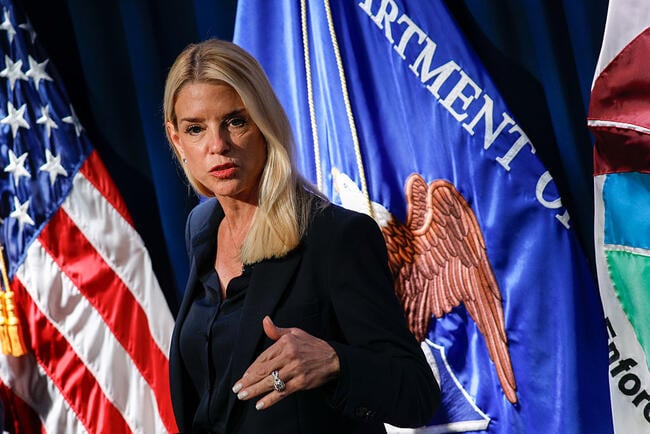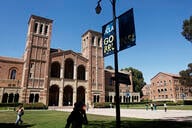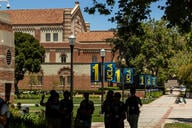You have /5 articles left.
Sign up for a free account or log in.

Attorney General Pamela Bondi authored the memo declaring all race-conscious practices unlawful.
Photo by Yasin Ozturk/Anadolu via Getty Images
More than three months after a federal court struck down an Education Department directive that barred any practices that consider race at colleges across the country, the Department of Justice declared Wednesday that diversity, equity and inclusion practices are unlawful and “discriminatory.”
But the agency’s memo goes even further than ED’s guidance, suggesting that programs that rely on what they describe as stand-ins for race, like recruitment efforts that focus on majority-minority geographic areas, could violate federal civil rights laws. The directive applies to any organization that receives federal funds, and DOJ officials warned that engaging in potentially unlawful practices could lead to a loss in grant funding.
Other examples of “potentially unlawful proxies” include requirements that job applicants “demonstrate ‘cultural competence,’ ‘lived experience,’ or ‘cross-cultural skills’” or narratives about how the applicant has overcome obstacles, Attorney General Pamela Bondi wrote.
This interpretation of federal law could present new challenges for colleges that have relied on tactics like place-based recruitment to create diverse student bodies since the Supreme Court banned affirmative action in 2023. For instance, some colleges have guaranteed admission to students who graduate in the top 10 percent of their high schools.
“This highlights that every practice of colleges is under scrutiny, even ones that have been viewed as politically safe for years (such as top ten percent plans or even TRIO programs). The only truly safe ways to admit students right now are to admit everyone or only use standardized test scores,” Robert Kelchen, a professor in the University of Tennessee at Knoxville’s Department of Educational Leadership and Policy Studies, wrote in an email to Inside Higher Ed. “Being an enrollment management leader has always been tough, but now it’s even more challenging to meet revenue targets and satisfy stakeholders who have politically incompatible goals.”
The document offers clearer guidance about what the Justice Department considers off-limits as it investigates DEI at colleges and universities. The DOJ is playing a greater role in investigating colleges as it enforces its position that DEI programs as well as efforts to boost diversity among faculty and staff violate federal antidiscrimination laws.
Since President Trump took office in January, he’s targeted DEI programs, practices and personnel via executive orders and other efforts. However, higher ed experts have repeatedly said that the orders don’t change the underlying laws, so colleges that complied with the law before Jan. 20 remain in compliance. In response to the federal edicts, colleges have rolled back a number of their programs and closed centers that catered to specific student groups.
Many of the practices declared unlawful in the nine-page memo echo those referenced in the Education Department’s February Dear Colleague letter, such as race-based scholarships. But it also explicitly states that “BIPOC-only study lounges” and similar facilities are unlawful. The Education Department’s guidance mentioned race-based facilities generally but not specifically study lounges.
DEI advocates have long argued that these centers or lounges are open to all students. Some have persisted even after state DEI bans, but multiple colleges have in recent months closed centers that catered to specific student groups. Bondi argued that such spaces violate Title VI of the Civil Rights Act of 1964, which bars discrimination based on race and national origin.
“Even if access is technically open to all, the identity-based focus creates a perception of segregation and may foster a hostile environment. This extends to any resource allocation—such as study spaces, computer labs, or event venues—that segregates access based on protected characteristics, even if intended to create ‘safe spaces,’” the order reads.
Lynn Pasquerella, president of the American Association of Colleges and Universities, said that the memo is “another example of governmental overreach into academic freedom, institutional autonomy and shared governance that conditions federal funding on ideological alignment with the administration’s viewpoints.”
She added that the guidelines in the document violate existing constitutional protections and erode federal civil rights law.
“What is missing from the DOJ narrative on DEI is that treating people differently is not always unjust, especially when doing so corrects a broader pattern of systemic injustice. Considering race and gender in the context of historic unjust discrimination to inform policies and practices at colleges and universities doesn’t in and of itself constitute illegal discrimination, though the letter suggests otherwise.”
Beyond race-based practices, the letter also addresses transgender student athletes, building on the Trump administration’s previous actions that advocates say deny the existence of trans individuals and roll back their rights. The memo states that it would “typically be unlawful” for someone assigned male at birth to compete on women’s sports teams or for an institution to “compel” individuals to share an intimate space, like a locker room, with someone of another sex.
Pasquerella noted that the letter offers guidance, not legal mandates.
“Nevertheless,” she said, “what are described as ‘best practices and nonbinding suggestions’ will likely cause another wave of anticipatory compliance and overcorrection given the climate of fear and intimidation created by the weaponization of research funds.”




